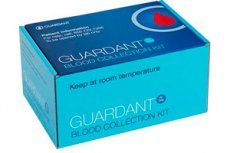New publications
FDA approves blood test to detect colorectal cancer
Last reviewed: 02.07.2025

All iLive content is medically reviewed or fact checked to ensure as much factual accuracy as possible.
We have strict sourcing guidelines and only link to reputable media sites, academic research institutions and, whenever possible, medically peer reviewed studies. Note that the numbers in parentheses ([1], [2], etc.) are clickable links to these studies.
If you feel that any of our content is inaccurate, out-of-date, or otherwise questionable, please select it and press Ctrl + Enter.

A U.S. Food and Drug Administration (FDA) advisory panel on Thursday recommended approval of a new blood test that can detect colon cancer.
The panel voted 7-2 that the benefits of Guardant Health's Shield test outweigh the risks when used to diagnose colon cancer.
"The advisory committee's strong support for approval of Shield underscores the important role that a blood test option can play in improving [colon cancer] screening rates for those at average risk," Guardant co-chairman AmirAli Talasaz said in a company press release announcing the vote.
"Despite the importance of early detection of colorectal cancer, there are significant barriers that may prevent average-risk Americans from receiving existing screening methods," Talasaz added. "Shield is effective at detecting cancer early, when it is most treatable. Providing people with this blood test along with other noninvasive stool tests could increase screening rates and potentially reduce the number of preventable [colon cancer] deaths."
If the FDA approves the Shield test, it would be the second blood test to diagnose colon cancer in the U.S.: The first test, Epigenomics' Epi proColon, was approved in 2016.
Each year, approximately 150,000 patients in the United States are diagnosed with colon cancer, and it is the second leading cause of cancer death in the country, resulting in more than 50,000 deaths per year, according to the American Cancer Society.
Colonoscopy is currently the gold standard for colon cancer testing, but compliance is low due to its invasiveness and complicated preparation for the test. Other methods include stool tests, such as Exact Sciences' Cologuard, but blood tests are considered more convenient, NBC News reported.
Panel members expressed concern that Guardant's test was not as accurate as a colonoscopy, especially since Shield detected only 13% of precancerous tumors called advanced adenomas, NBC News reported. That issue was also raised by FDA staff in internal documents.
Guardant's application for approval was based on a study showing the test detected 83% of colon cancer cases, according to FDA documents.
"Shield is better than nothing, but I don't want to downplay the fact that this test could miss a lot of cancers," panel member Charity Morgan, a professor in the University of Alabama's department of biostatistics, said during the panel's hearing, NBC News reported.
The company expects the test will need to be repeated every one to three years, Guardant Health CEO Victoria Raymond said during the meeting, but added that "colonoscopy should be the first option," NBC News reported.
